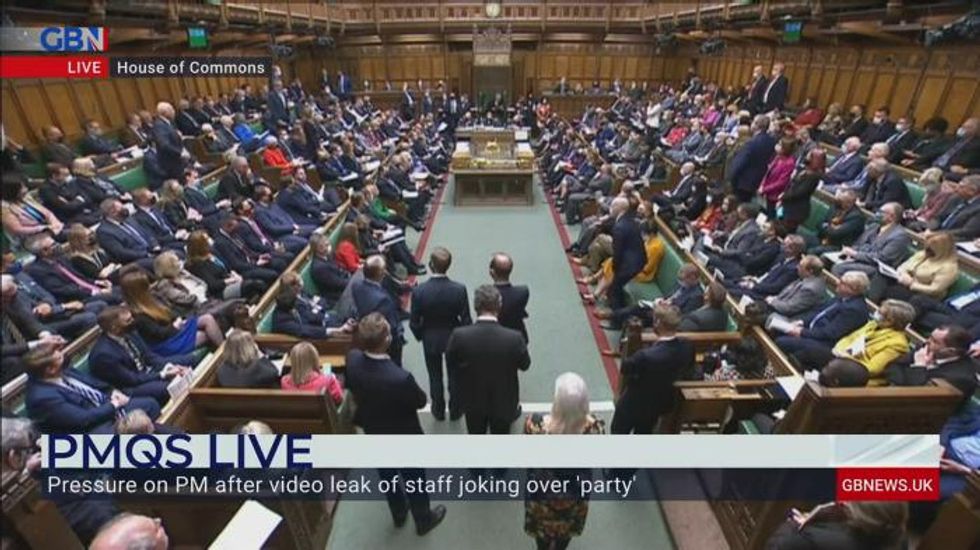Don't Miss
Most Read
Trending on GB News
Britain, Australia and the United States will pay a price for their "mistaken acts" after deciding not to send government delegations to February's Winter Olympics in Beijing, China's foreign ministry said on Thursday.
The United States was the first to announce a boycott, saying on Monday its government officials would not attend the Feb. 4-20 Games because of China's human rights "atrocities", weeks after talks aimed at easing tension between the world's two largest economies.
"The United States, Britain and Australia have used the Olympics platform for political manipulation," said Wang Wenbin, a spokesperson at the Chinese foreign ministry.
"They will have to pay the price for their mistaken acts," he told a regular news conference.
Relations between Beijing and Washington deteriorated sharply under former U.S. President Donald Trump and the Biden administration has maintained pressure on China.
Disagreements have centred on various issues including trade, the origins of the coronavirus and China's maritime claims in the South China Sea.
Boris Johnson has said there will “effectively be a diplomatic boycott” of the Winter Olympics in Beijing given that no UK ministers or officials will be attending.
Conservative former leader Sir Iain Duncan Smith begged the Prime Minister to ensure the UK follows the lead of the United States by having a full diplomatic boycott of the Games in February.
Mr Johnson said the Government has “no hesitation” in raising concerns over human rights abuses with China, adding in the Commons: “There will be effectively a diplomatic boycott of the Winter Olympics in Beijing.
“No ministers are expected to attend and no officials.
“What I can tell the House is I don’t think sporting boycotts are sensible and that remains the policy of the Government.”
Both the US and Australia have announced diplomatic boycotts over Beijing’s record on human rights, particularly the treatment of the Uighur Muslim community in Xinjiang province.
The Princess Royal, who is president of the British Olympic Association and a member of the International Olympic Committee, is meeting with the IOC on Thursday to discuss timings ahead of the opening ceremony.
Anne will be considering the options for travelling to the IOC meetings and games, a source said.
Sir Iain welcomed the Prime Minister’s announcement and said he hoped “many other countries will follow suit”.
Australian Prime Minister Scott Morrison said he was announcing a boycott because it is “the right thing to do”.
In Australia’s case, it was not only human rights concerns but also a series of political disputes with China which had triggered the move – including the Aukus pact with the UK and US over nuclear-powered submarines.
He said his government was very happy to talk to China about their differences “but the Chinese government has consistently not accepted those opportunities for us to meet”.
Australian Prime Minister Scott Morrison said earlier that its decision not to send officials to the Games was made because of its struggles to reopen diplomatic channels with China to discuss human rights in the far western region of Xinjiang and China's moves to block Australian imports.
China has denied any wrongdoing in Xinjiang, home to the Uyghur Muslim minority, and said allegations of right abuses were fabricated.
On Wednesday, the U.S. House of Representatives passed legislation to ban imports from Xinjiang over concern about forced labour, one of three measures backed overwhelmingly as Washington pushes back against Beijing's treatment of the Uyghur community.
"China firmly opposes this," said Gao Feng, a spokesman at the Chinese commerce ministry, referring to the U.S. action.
"The United States should immediately stop its wrongdoing. We will take necessary measures to resolutely safeguard China's legitimate rights and interests," Gao told a regular news conference.
The United States was practising unilateralism, protectionism and bullying China in the name of "human rights", he said.
The U.S. stand would seriously hurt the interests of the companies and consumers of the two countries, aggravate global supply chain tension and weigh on the global economic recovery, Gao warned.
The House backed the "Uyghur Forced Labor Prevention Act" by an overwhelming 428-1. To become law, it must also pass the Senate and be signed by President Joe Biden.











